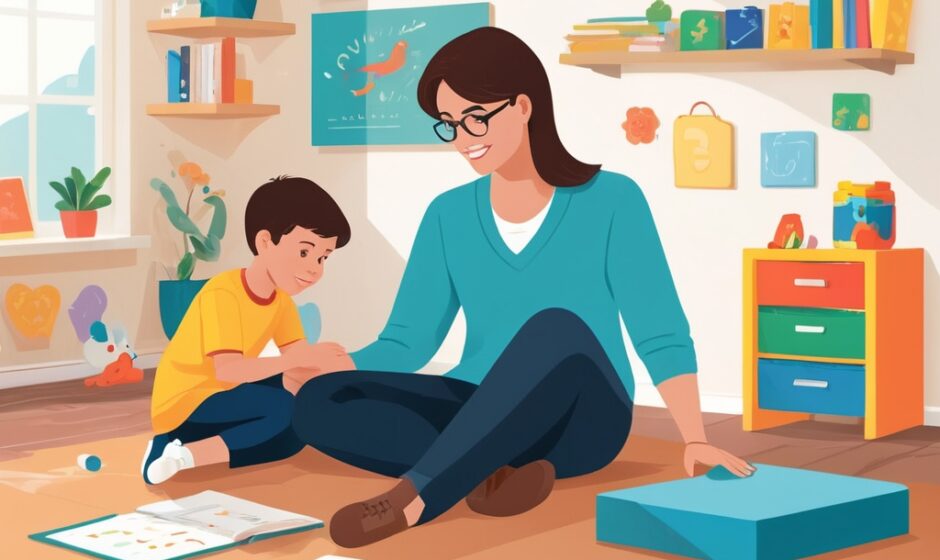Understanding the Social Challenges of Learning Disabilities
Learning disabilities (LD) such as dyslexia, dyscalculia, and dysgraphia primarily affect cognitive and academic abilities, but they often come with social challenges. Learning-disabled kids may have trouble with:
- Reading social cues: Difficulty understanding body language, tone of voice, or facial expressions.
- Communication: Trouble expressing themselves clearly or understanding complex conversations.
- Making and keeping friends: Struggles in joining social activities, maintaining friendships, or navigating group dynamics.
- Emotional regulation: Difficulty managing frustration, anxiety, or low self-esteem, which can affect social interactions.
These social challenges can lead to isolation, frustration, and emotional distress. Addressing these difficulties is essential for the child’s overall development and well-being, and learning disability therapy provides targeted strategies to help children thrive socially.
1. Role-Playing and Social Scenarios
One of the most effective techniques in learning disability therapy for improving social skills is role-playing. In a safe and supportive environment, therapists help children practice social interactions through guided role-playing activities. These exercises allow children to:
- Simulate real-life situations: Engage in scenarios like making introductions, sharing, or working in groups.
- Practice responses: Learn how to respond appropriately in different social contexts.
- Improve communication skills: Work on both verbal and non-verbal communication.
Role-playing helps children develop a better understanding of social cues and gives them the confidence to apply these skills in real-life settings. This structured approach is a key component of learning disability treatment, particularly for children with difficulties in social interactions.
2. Social Stories
Social stories are another tool used in learning disability therapy to teach social skills. These are short, descriptive narratives that explain specific social situations in a way that is easy for children to understand. For example, a social story might describe how to behave at a birthday party, including when to say “thank you” or how to join a group activity.
Social stories are beneficial because they:
- Break down social situations: Make complex social interactions more manageable by outlining step-by-step expectations.
- Provide clear examples: Help children understand what behavior is expected in different situations.
- Reduce anxiety: Prepare children for social events, which can lower anxiety and improve social confidence.
By incorporating social stories into learning disability treatment, therapists can help children better navigate various social environments.
3. Group Therapy and Social Skills Groups
Group therapy is a valuable aspect of learning disability therapy that focuses on building social skills in a peer setting. Social skills groups bring together children with similar challenges, offering them an opportunity to practice interactions in a supportive and structured environment. In these groups, children can:
- Engage with peers: Practice making friends, sharing, and participating in conversations.
- Receive immediate feedback: Get guidance from therapists and peers on how to improve interactions.
- Build confidence: Gain social confidence by experiencing success in a safe, controlled environment.
Group therapy fosters a sense of belonging and helps children understand that they are not alone in their struggles. This aspect of learning disability treatment is essential for helping children develop stronger peer relationships.
4. Emotional Regulation Techniques
Social interactions are closely tied to emotional regulation. Many children with learning disabilities experience frustration, anxiety, or low self-esteem due to their struggles, which can impact their ability to engage with others. Learning disability therapy often incorporates emotional regulation techniques to help children manage their emotions in social situations. These techniques include:
- Mindfulness exercises: Teaching children to stay present and calm during social interactions.
- Deep breathing and relaxation strategies: Helping children manage anxiety before or during social encounters.
- Cognitive Behavioral Therapy (CBT): Assisting children in recognizing and reframing negative thought patterns that affect their social interactions.
By addressing emotional regulation, learning disability treatment provides children with the tools they need to interact more effectively and confidently with their peers.
5. Building Self-Esteem and Confidence
Children with learning disabilities often struggle with low self-esteem, especially when they compare themselves to their peers. A key component of learning disability therapy is helping children build their self-esteem by recognizing their strengths and accomplishments, both academically and socially. Therapists focus on:
- Positive reinforcement: Celebrating small successes in social situations.
- Setting achievable goals: Encouraging children to set and achieve small, manageable social goals.
- Developing a growth mindset: Teaching children that mistakes are part of learning and that they can improve over time.
By building self-esteem, children are more likely to take social risks, such as initiating conversations or joining group activities, which are critical to developing social skills.
Conclusion
Learning disability therapy is not limited to improving academic performance—it plays a vital role in helping children develop social skills and emotional resilience. Through techniques like role-playing, social stories, group therapy, emotional regulation, and self-esteem building, learning disability treatment addresses the unique social challenges children with learning disabilities face.
By focusing on these social aspects, therapists help children navigate their world with more confidence, forming meaningful relationships and participating in social activities. If you suspect your child could benefit from learning disability therapy, early intervention is key. With the right support, children with learning disabilities can develop strong social skills, which are essential for both their personal growth and overall success in life.



